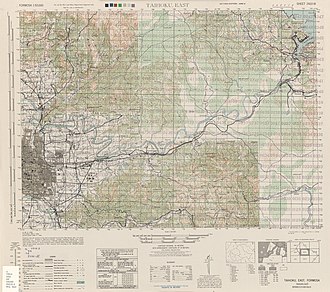Taipei
Capital city of Taiwan

Taipei (臺北市) is the capital and a special municipality of Taiwan. Located in the northern part of the island, Taipei is the political, economic, and cultural center of Taiwan. The city is situated on the Tamsui River and is surrounded by the Yangmingshan National Park to the north and the Xindian River to the south.
History[edit]

The area of modern-day Taipei was originally inhabited by the Ketagalan plains aborigines. The city began to develop in the early 18th century under Qing dynasty rule, when immigrants from Fujian province in China began to settle in the area. Taipei became an important administrative and commercial center during the Qing dynasty.
In 1895, following the First Sino-Japanese War, Taiwan was ceded to Japan, and Taipei was established as the capital of the island under Japanese rule. The Japanese colonial period saw significant urban development and modernization in Taipei, including the construction of new roads, railways, and public buildings.
After World War II, Taiwan was returned to Chinese control, and Taipei was declared the provisional capital of the Republic of China in 1949, following the Chinese Civil War.
Geography[edit]
Taipei is located in the Taipei Basin, an ancient lakebed surrounded by mountains. The city is bordered by the Yangmingshan National Park to the north, which is known for its hot springs and volcanic landscapes. The Xindian River and Tamsui River flow through the city, providing natural beauty and recreational opportunities.
Climate[edit]
Taipei has a humid subtropical climate, with hot, humid summers and mild, damp winters. The city experiences frequent rainfall, especially during the summer months, and is occasionally affected by typhoons.
Economy[edit]

Taipei is the economic hub of Taiwan, with a diverse economy that includes technology, finance, and manufacturing. The city is home to the Taiwan Stock Exchange and numerous multinational corporations. Taipei is also a major center for the semiconductor industry, with many leading technology companies headquartered in the city.
Culture[edit]

Taipei is a vibrant cultural center, with a rich blend of traditional and modern influences. The city is known for its lively night markets, such as the Shilin Night Market, where visitors can sample a wide variety of local foods. Taipei is also home to many museums, theaters, and cultural institutions, including the National Palace Museum, which houses one of the largest collections of Chinese art and artifacts in the world.
Landmarks[edit]

Taipei is home to many iconic landmarks, including the Taipei 101, which was the world's tallest building from 2004 to 2010. Other notable sites include the Chiang Kai-shek Memorial Hall, the National Theater and Concert Hall, and the Presidential Office Building.

The city also boasts several historic temples, such as the Lungshan Temple and the Confucius Temple, which reflect Taipei's rich cultural heritage.
Transportation[edit]
Taipei has a well-developed transportation network, including the Taipei Metro, which provides efficient and convenient public transit throughout the city. The city is also served by the Taiwan High Speed Rail, which connects Taipei to other major cities on the island.
Related pages[edit]
Ad. Transform your life with W8MD's Budget GLP-1 injections from $75


W8MD offers a medical weight loss program to lose weight in Philadelphia. Our physician-supervised medical weight loss provides:
- Weight loss injections in NYC (generic and brand names):
- Zepbound / Mounjaro, Wegovy / Ozempic, Saxenda
- Most insurances accepted or discounted self-pay rates. We will obtain insurance prior authorizations if needed.
- Generic GLP1 weight loss injections from $75 for the starting dose.
- Also offer prescription weight loss medications including Phentermine, Qsymia, Diethylpropion, Contrave etc.
NYC weight loss doctor appointmentsNYC weight loss doctor appointments
Start your NYC weight loss journey today at our NYC medical weight loss and Philadelphia medical weight loss clinics.
- Call 718-946-5500 to lose weight in NYC or for medical weight loss in Philadelphia 215-676-2334.
- Tags:NYC medical weight loss, Philadelphia lose weight Zepbound NYC, Budget GLP1 weight loss injections, Wegovy Philadelphia, Wegovy NYC, Philadelphia medical weight loss, Brookly weight loss and Wegovy NYC
|
WikiMD's Wellness Encyclopedia |
| Let Food Be Thy Medicine Medicine Thy Food - Hippocrates |
Medical Disclaimer: WikiMD is not a substitute for professional medical advice. The information on WikiMD is provided as an information resource only, may be incorrect, outdated or misleading, and is not to be used or relied on for any diagnostic or treatment purposes. Please consult your health care provider before making any healthcare decisions or for guidance about a specific medical condition. WikiMD expressly disclaims responsibility, and shall have no liability, for any damages, loss, injury, or liability whatsoever suffered as a result of your reliance on the information contained in this site. By visiting this site you agree to the foregoing terms and conditions, which may from time to time be changed or supplemented by WikiMD. If you do not agree to the foregoing terms and conditions, you should not enter or use this site. See full disclaimer.
Credits:Most images are courtesy of Wikimedia commons, and templates, categories Wikipedia, licensed under CC BY SA or similar.
Translate this page: - East Asian
中文,
日本,
한국어,
South Asian
हिन्दी,
தமிழ்,
తెలుగు,
Urdu,
ಕನ್ನಡ,
Southeast Asian
Indonesian,
Vietnamese,
Thai,
မြန်မာဘာသာ,
বাংলা
European
español,
Deutsch,
français,
Greek,
português do Brasil,
polski,
română,
русский,
Nederlands,
norsk,
svenska,
suomi,
Italian
Middle Eastern & African
عربى,
Turkish,
Persian,
Hebrew,
Afrikaans,
isiZulu,
Kiswahili,
Other
Bulgarian,
Hungarian,
Czech,
Swedish,
മലയാളം,
मराठी,
ਪੰਜਾਬੀ,
ગુજરાતી,
Portuguese,
Ukrainian